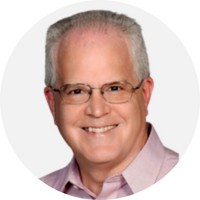The views expressed in our content reflect individual perspectives and do not represent the authoritative views of the Baha'i Faith.
When I heard, a month after my first visit with my dying friend George, that he was entering hospice, I wanted to help.
I wanted to be present for him, to provide some wind at his back, to encourage his steadfastness, to cheer him over the finish line, to focus on the blessed joy of his future, and to advocate for pain relief in the present.
It was no sacrifice. It was what friends do. Since the family needed day-to-day help, and his wife knew me as George’s close friend, Ellen and I were invited to stay with them, in the bedroom next to George.
Ellen and I drove to Murfreesboro again. Our second visit had a different air – more intense, more reverent, and more celebratory. Outwardly, George was dying. His body was ravaged by necrosis and its effects. But inwardly he was more than ever intent on the good he had known, and on guiding and encouraging those he loved.
RELATED: How Do We Face Our Own Death?
George chose to die at home rather than receive in-patient hospice care, where more effective pain relief was promised. At home, the meds were far less potent. “If he took them all at once, it would just make him sleep through the night,” said the nurse. But no matter because, during the first week, George wouldn’t take them anyway. Only in his last two days on this Earth, with his body fully shutting down, did he accept enough to alleviate pain.
There was no sense of “death” or ending around him, either. He wanted to grow closer to God, to prepare himself to meet God. He felt grateful to share prayers, and liked to alternate, himself saying Baha’i prayers that he knew by heart, and then visitors saying theirs. He didn’t care whether his visitor’s prayers were Baha’i, Bible passages, or simply from the heart of the speaker. When someone couldn’t visit, he asked to say prayers together over the phone. Toward the end, my wife or I would just recite prayers for him between visitors.
George loved his visitors. Everyone felt it. With kind words and uplifting admonitions he reminded people to look after those around them, sometimes naming specific people he wanted them to care for. Increasingly, his breath came only in gasps, but what words he could say were focused on love or empathy. His pain was evident and surely contributed to his willingness to go. But equally evident, pain was not what he wanted to think about. It was as if pain was just his way of letting us know, first, that God is bigger than his pain, and second, that we, too, were more important to him than what his body felt. Yes, we were gathered for his death, but he was busy with life.
His spiritual final exam became that of his visitors, each seemingly wanting him to know that they had learned the lessons he had tried to instill over all these years. “See how we’re here for each other?” they said to him. His pain was not only intolerable to him, it was also intolerable to them. To help George become comfortable letting go of this world, his children tried to become even more “of” this world, more alive in this world. They did not want him to suffer more on their behalf. What a confirmation for George!
Later, George’s son Ivan told me that a few days before my second arrival, he had been visiting George along with Ivan’s brother and George’s wife. George lay there with eyes closed, breathing weakly, quietly. When the other two left, as soon as the door was closed, George – who had not opened his eyes – started to clench his teeth and to moan in pain. Apparently, George thought all three were gone because when Ivan said something to him, he suddenly opened his eyes very wide, seemingly shocked that someone was still in the room, and he stopped expressing that pain. This revealed to Ivan George’s true agony, which Ivan suddenly understood as having been long-endured. He told George, “If you’re in this kind of pain, Daddy, you don’t need to stay in this world for the family’s sake. We will be okay, we will take care of each other.” This experience prepared Ivan to support his father and his siblings during the difficult days that followed.
George willingly shared the increased intensity of his life with us. Images that came to me: George with a radiant smile steering a high-speed toboggan toward a great goal, and we were all welcomed to ride behind him for a time, with wind whistling in our ears and a sense of freedom and power and excitement!
Or an open door through which George was invited to leave this testy world for one in which there would be no agony, no racist aggressions crushing him, no dyslexia inhibiting his learning, no darksome nights of human betrayals, no painful illness. Toward that world, he beckoned us, like the characters in the C.S. Lewis Narnia tales, “Come further up, come further in!” Mr. Lewis describes it as being, “… in a story: in a story you have never heard but very much want to know.” Once ensconced in that beckoning new world, we were certain George would go from adventure to adventure, joy to joy, learning to learning, service to service, friendship to friendship, just as Baha’u’llah described in the Baha’i writings:
Blessed is the soul which, at the hour of its separation from the body, is sanctified from the vain imaginings of the peoples of the world. Such a soul liveth and moveth in accordance with the Will of its Creator, and entereth the all-highest Paradise. The Maids of Heaven, inmates of the loftiest mansions, will circle around it, and the Prophets of God and His chosen ones will seek its companionship. With them that soul will freely converse, and will recount unto them that which it hath been made to endure in the path of God, the Lord of all worlds.
While George was being beckoned, we somehow got a glimpse through his door. Transported by the vision, I yearned to be a fly on the wall to hear George’s whole story when he was telling what he had “been made to endure in the path of God.”
RELATED: Can We Communicate with Our Loved Ones Who Have Passed On?
Then, imagining my own death, I felt grateful for what I myself had been allowed to endure in the path of God until, almost immediately, like a child, I wished I had more to tell! More … difficulty? Radiant acquiescence? Calling others to the path that can lead to happiness? In George’s life, these were all of a piece. His resilient attitude in action was his testimony. It both called others to their best selves and allowed them to examine freely what he believed. In the same breath in which he fulfilled the purpose of his individual life, he also met his obligation to share his findings.
As exciting as it was to think about George’s future in the world beyond, for the rest of us, it was a “thus far and no farther” moment. We probably all welcomed that pause, a pause that invited us to reflect, to improve our own characters now, while we can. Did not George live by Baha’u’llah’s injunction to “Bring thyself to account each day ere thou art summoned to a reckoning,” as he expressed no unfinished personal business, no regrets that he yet needed to express? That shining example tugged at the heart of each of us.
The night before George’s last day on this plane of existence, my wife and I took shifts all night, giving him meds on the hour and praying.
Several of his children were there as he took his last breath, saying prayers with him. Just after the last prayer, one of them put on music for George. Then he stopped breathing. It was about 7 pm. The world was different for his children, for his wife, for many of us. The missing part could be seen in the eyes. Yet each of us also stood a little taller. Each was more committed to becoming the best person possible.
There was nothing sad for me, yet I wept uncontrollably, as I am again while writing this. What I felt was gratitude at seeing a life so well-lived, and relief that George’s suffering had ended, and exhaustion from being so close to so much life.
















Comments
Sign in or create an account
Continue with Googleor